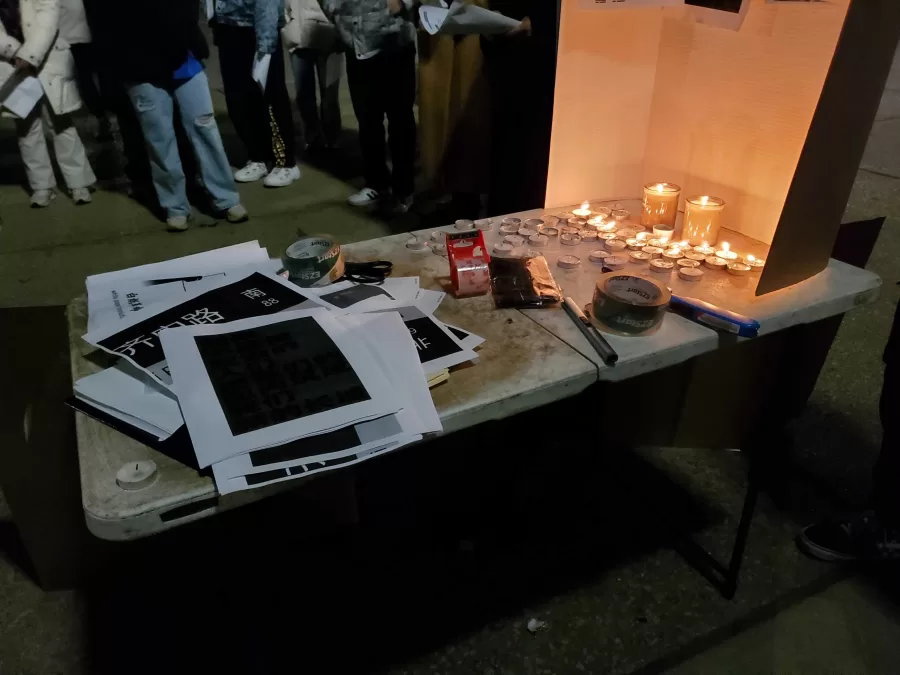Student activists attend vigil calling for an end to China’s zero-COVID policy
November 29, 2022
Ten candles lit for 10 deaths. Standing for minutes of silence, University students encircled the memorial, holding their words to commemorate the dead.
During a COVID-19 lockdown, 10 people died in an apartment fire in Xinjiang, China. In response, protests and vigils began worldwide, including at the University, remembering those who lost their lives and calling for an end to China’s Zero-COVID policy.
“We just ask for the freedom to go outside, work and have a normal day-to-day life,” said a junior in Engineering.
After one person tested positive in his family’s apartment, the student said the entire building was locked down for eight days. However, people in Xinjiang were locked down for three months.
“They lost their job, so (they had) no income. How are they supposed to get food? How are they supposed to sustain their lives?” he said. “It is not possible.”
Get The Daily Illini in your inbox!
However, he said the protests went further than China’s zero-COVID policy.
“(The) government doesn’t really care about employment and how people are able to get their (necessities),” he said. “They overlooked the requests of the people (because) there’s basically no democracy within the government.”
According to him, the movement will keep growing through social platforms like Telegram, Instagram and Twitter.
In China, one method of protest used was the “white paper revolution,” where people held a blank piece of paper above their heads.
“The white paper doesn’t say anything, but it implies everything,” the student said. “Because (they’ve) said nothing, the government and the police cannot accuse (them) of anything.”
At the University, activists showed their support by chanting in Chinese.
“No COVID, but food. No lockdown, but freedom. No disinformation, but votes. No cultural revolution, but reform. No leadership, but democracy,” they said. “To not be enslaved, but be a citizen.”
After they finished, the student said there was a proponent of CCP, China’s Communist Party, shouting statements that contradicted their message. However, facing opposition did not stop those present from continuing the vigil.
One of the activists put a white hazmat suit on the ground and set it on fire. According to the activist, it is what government officials wear when they transfer people who tested positive for COVID-19.
“When people dress up (in these suits), you don’t really know who’s behind the mask, who’s behind the clothes,” the activist said. “When people are hiding behind this, they have more courage to hurt others.”
According to the activist, the sentiments behind the protests were always there, however, the deaths in Xinjiang pushed people forward.
“It was just a breaking point,” the activist said. “People started realizing that this could be me.”
The government didn’t apologize until after the protests started, the activist noted. The lack of remorse and action from the CCP, along with more aggressive COVID-19 policies, was the turning point for many people.
The activist went on to explain that in Beijing, COVID-19 testing requirements went from every three days to everyday. In Shanghai, their significant other was locked down for three months from March to June of this year.
“You’re not even able to get out of your house,” the activist said. “It was total hell.”
The activist said the government promised loosened COVID-19 restrictions, but nothing has changed.
According to the activist, withdrawing the policy would make China’s leader, Xi Jinping, lose face and frame him as unwise or unfit to rule.
“He must always be correct,” a second activist said. “Always wise.”
Against a ruler with so much support, a second activist said, vigils must be staged to support protesters in China.
However, those who are caught face imprisonment in a room with no furniture, phone, sleep, or food, a third activist said.
In the U.S., where they do not get threatened for their speech, the second activist said, they have to speak up for Chinese protesters.
“If it’s not us who are speaking for them right now, who would speak for them?” the second activist said.
According to the second activist, the vigils staged around the world honored those who died in the fire and let other protesters know they are not alone.
“In the documentary of the Tiananmen Massacre, he said, ‘It’s my duty,’” the second activist said. “And I think, yeah, it’s our duty.”







